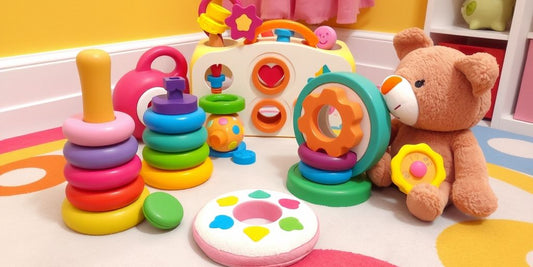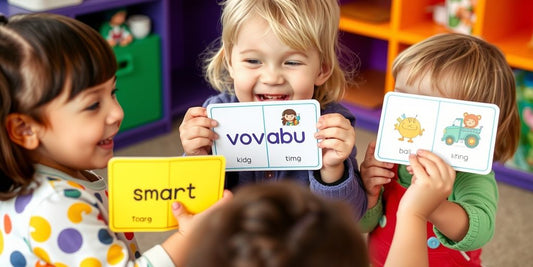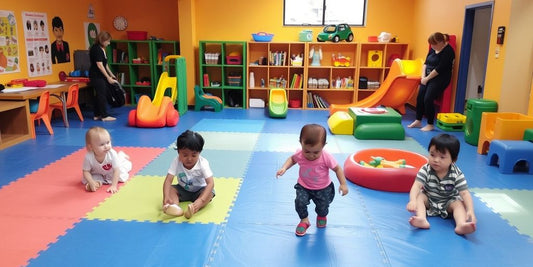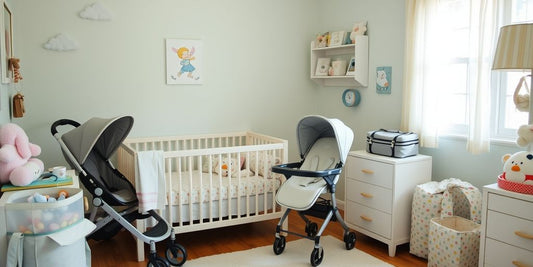Welcome to the world of safe and eco-friendly baby products! In this article, we will dive into various baby items that prioritize your child's health and promote sustainability. With the rising awareness of the impact of traditional products on both the environment and your baby's well-being, many parents are turning to greener alternatives. From organic cotton clothing to non-toxic baby skincare, these products are crafted with your baby's safety in mind. By opting for eco-friendly choices, you not only shield your child from harmful chemicals but also contribute to a healthier planet.
Key Takeaways
- Choosing eco-friendly baby products helps protect your baby from harmful chemicals found in traditional items.
- Eco-friendly products are made from natural and organic materials that are gentle on your baby's skin and the environment.
- Sustainable baby items, like cloth diapers and wooden toys, reduce waste and promote a greener future.
- Look for certifications like OEKO-TEX or USDA Organic when selecting eco-friendly baby products to ensure their authenticity.
- Incorporating eco-friendly products into your routine sets a positive example for your child about the importance of caring for our planet.
Understanding the Importance of Eco-Friendly Baby Products

Health Benefits for Babies
Choosing eco-friendly baby products is not just a trend; it's a crucial step for your baby's health. These products are made with natural, non-toxic materials that are gentle on your baby's skin and free from harmful chemicals. For instance, organic cotton clothing and biodegradable diapers help minimize exposure to allergens and irritants. This means fewer skin rashes and other health issues for your little one.
Environmental Impact
Eco-friendly baby products also have a positive impact on the environment. By using renewable resources and reducing waste, these items help conserve resources for future generations. For example, biodegradable baby wipes break down much faster than traditional ones, lessening the impact on landfills. Choosing organic baby food supports environmental sustainability through eco-friendly farming practices that prioritize soil health and biodiversity.
Economic Advantages
While eco-friendly products might seem more expensive initially, they often prove to be cost-effective in the long run. Many of these products are designed to be durable and long-lasting. For example, cloth diapers can be reused multiple times, reducing the need for constant repurchasing. Additionally, opting for sustainable products can save you money on healthcare costs by minimizing your baby's exposure to harmful substances.
Choosing Non-Toxic Baby Products
When it comes to your baby's health, choosing non-toxic products is crucial. Many conventional baby items contain harmful chemicals that can affect your baby's development. Here's how to make safer choices.
Identifying Harmful Chemicals
Unfortunately, just searching “non-toxic baby items” on Google doesn't always bring you the best results. Many blogs tout the best “natural” items, but it's essential to know what to avoid. Harmful chemicals to watch out for include:
- BPA and BPS
- Phthalates
- Formaldehyde
- Flame retardants
- PVC
- Lead and other heavy metals
- Synthetic fragrances
Safe Alternatives to Common Products
Opt for products made from natural materials. For example, choose glass or stainless steel baby bottles instead of plastic ones. Look for organic cotton clothing and bedding, which are free from pesticides and synthetic fertilizers. Brands like Momease Care Baby Seat™ offer safe and comfortable options for your baby.
Certifications to Look For
Certifications can help you identify non-toxic products. Look for labels such as:
- GOTS (Global Organic Textile Standard) for clothing and bedding
- GREENGUARD for furniture and mattresses
- BPA-free labels for bottles and utensils
Choosing non-toxic products not only protects your baby but also sets a positive example for a healthier lifestyle.
Eco-Friendly Baby Clothing and Accessories
Choosing eco-friendly baby clothing and accessories is a great way to ensure your baby is safe and comfortable while also protecting the environment. Here are some key points to consider:
Organic Fabrics and Materials
Organic baby clothing is made from materials like organic cotton, bamboo, and hemp. These fabrics are grown without harmful pesticides and chemicals, making them gentle on your baby's skin. Organic cotton is a popular choice because it is soft and breathable. Brands like [Tenth & Pine® offer a range of 100% organic clothes and accessories for babies and toddlers](https://tenthandpine.com/), trusted by moms for a sustainable, healthy life.
Sustainable Clothing Brands
Several brands specialize in eco-friendly baby clothing. Look for certifications like GOTS (Global Organic Textile Standard) to ensure the authenticity of organic products. Some brands also emphasize ethical manufacturing practices, ensuring safe working conditions and fair wages for their workers. This adds an extra layer of consideration to your childcare choices.
DIY and Secondhand Options
Creating your own baby clothes or buying secondhand can be both eco-friendly and budget-friendly. DIY projects allow you to customize clothing to your liking, while thrift shopping reduces the demand for new products. Many baby essentials, such as clothing, strollers, and toys, can be found in excellent condition at a fraction of the original price. This approach not only saves money but also promotes a more sustainable lifestyle.
Creating an Eco-Conscious Nursery
Designing a nursery that is both safe for your baby and kind to the planet is easier than you might think. By making thoughtful choices, you can create a space that is healthy, sustainable, and beautiful.
Non-Toxic Paint and Furniture
When setting up your baby's nursery, opt for non-toxic paint and furniture made from sustainable materials like bamboo or reclaimed wood. These choices ensure that your baby is not exposed to harmful chemicals and that the materials used are environmentally friendly.
Sustainable Decor Ideas
Decorate the nursery with eco-friendly elements such as natural fiber rugs, organic cotton bedding, and energy-efficient lighting. These small changes contribute to a more eco-conscious space for your little one.
Energy-Efficient Lighting
Choose energy-efficient lighting options like LED bulbs to reduce energy consumption. Not only do these bulbs last longer, but they also use less electricity, making them a more sustainable choice for your nursery.
Eco-Friendly Baby Feeding Solutions

BPA-Free Bottles and Utensils
When choosing baby bottles and utensils, it's crucial to opt for [BPA-free options](https://naturekidsco.com/blogs/learn/best-non-toxic-baby-bottles?srsltid=AfmBOopGVz1ZtAdAm9Xco8dQS6NQrqoIczf35OS0zvSJ8b98tlVvPX0A). BPA (bisphenol A) is a harmful chemical often found in plastic baby bottles and cups. Instead, look for bottles made from glass or stainless steel. These materials are not only safer but also more durable. Additionally, consider using natural and organic nipples and bottle accessories. Nipples made from medical-grade silicone are free from harmful chemicals like phthalates and BPA.
Organic Baby Food Options
For eco-friendly feeding, consider making your own baby food using organic fruits and vegetables. This approach reduces packaging waste and ensures that your baby gets fresh, nutritious meals. If making your own baby food isn't feasible, look for store-bought options that are certified organic and come in recyclable packaging.
Sustainable Breastfeeding Products
Choosing eco-friendly breastfeeding products not only protects your baby from harmful chemicals but also ensures a pure and safe feeding experience. Look for breast pumps and accessories made from sustainable materials. For example, the Momease Care Single Breast Pump™ offers efficient and comfortable pumping with features like adjustable suction and a soft silicone shield. Reusable nursing pads and glass milk storage containers are also excellent choices for reducing waste.
By choosing eco-friendly baby feeding solutions, you're not only safeguarding your baby's health but also contributing to a more sustainable future.
Sustainable Baby Toys and Playtime
Non-Toxic and Safe Toys
When choosing toys for your baby, it's crucial to opt for those made from non-toxic materials. Look for toys crafted from organic cotton, natural rubber, or sustainably harvested wood. These materials ensure that the toys are safe for babies to explore and play with.
Wooden and Recycled Plastic Toys
Wooden toys are not only durable but also biodegradable. They offer a great alternative to plastic toys, which can be harmful to the environment. Additionally, toys made from recycled plastic help reduce plastic waste and promote recycling efforts.
Battery-Free Toy Options
Battery-free toys are an excellent choice for eco-conscious parents. These toys often encourage more imaginative play and reduce the environmental impact associated with battery disposal. Consider options like The Play Kits by Lovevery, which are designed to be child-safe and sustainable, using materials like sustainably harvested wood and organic cotton.
Choosing sustainable toys not only benefits the environment but also ensures a safer playtime for your baby.
Eco-Friendly Baby Bathing Essentials
Natural Bath Products
When it comes to your baby's bath time, choosing natural and chemical-free bath products is crucial. Look for gentle and organic shampoos, body washes, and lotions that are free from harsh additives and synthetic fragrances. These products not only promote healthy skin but also have a minimal impact on the environment when washed away. Brands like Green People offer baby wash in unscented, berry smoothie, and lavender burst varieties, with organic aloe vera juice as a key ingredient.
Eco-Friendly Bath Accessories
Enhance your baby's bath time with eco-friendly accessories such as biodegradable bath sponges and washcloths made from sustainable materials like bamboo or organic cotton. These accessories are soft and gentle on the baby's skin while also being kind to the planet.
Water Conservation Tips
Bath time can use a lot of water, so it's important to be mindful of conservation. Here are some tips to help you save water:
- Use a baby bathtub instead of filling up a large tub.
- Turn off the tap while soaping up your baby.
- Reuse bath water for watering plants if possible.
Making small changes in your baby's bath routine can have a big impact on the environment. By choosing eco-friendly products and being mindful of water usage, you can create a healthier planet for your little one.
Tips for an Eco-Friendly Baby Registry
Creating an eco-friendly baby registry is a great way to ensure your baby starts life with safe and sustainable products. Here are some tips to help you make the best choices:
Choosing the Right Products
When creating your registry, carefully research the products you want to include. Look for certifications like OEKO-TEX or USDA Organic to ensure the authenticity of eco-friendly claims. Prioritize items that align with your values and sustainability goals.
Prioritizing Sustainability
Encourage friends and family to support your eco-friendly journey by requesting sustainable gifts for your baby. Let them know about your preferences for organic clothing, natural baby care products, or donations to eco-friendly causes in lieu of traditional presents.
Budget-Friendly Eco Choices
You don't have to break the bank to go green. Consider DIY projects like cloth diapers, cloth wipes, and homemade baby food. Thrift stores and online platforms are also great places to find secondhand baby items in excellent condition at a fraction of the original price. This not only saves money but also reduces the demand for new products, contributing to a more sustainable lifestyle.
Conclusion
Choosing safe and eco-friendly baby products is a wonderful way to care for your little one and the planet. By opting for items made from natural, non-toxic materials, you ensure your baby's health and comfort while also promoting sustainability. Whether it's organic cotton clothing, biodegradable diapers, or non-toxic skincare, these choices help reduce your family's environmental footprint. Remember, every small step counts. By making thoughtful decisions, you not only protect your baby from harmful chemicals but also set a positive example for future generations. Let's embrace a greener lifestyle for the well-being of our children and the Earth.
Frequently Asked Questions
Why should I choose eco-friendly baby products?
Eco-friendly baby products are made from natural and non-toxic materials, which are safer for your baby's health. They also help reduce environmental impact and promote sustainability.
What harmful chemicals should I avoid in baby products?
Avoid chemicals like phthalates, parabens, BPA, and artificial fragrances. These can be found in many conventional baby products and can be harmful to your baby's health.
Are eco-friendly baby products more expensive?
While some eco-friendly baby products may have a higher upfront cost, they often prove to be more economical in the long run. For example, reusable cloth diapers can save money over time compared to disposable ones.
How can I identify truly eco-friendly baby products?
Look for certifications such as OEKO-TEX, USDA Organic, or GOTS. These certifications indicate that the products meet certain environmental and safety standards.
Can I make my own eco-friendly baby products?
Yes, you can make items like cloth diapers, cloth wipes, and homemade baby food. DIY projects can be cost-effective and allow you to control the materials used.
What are some sustainable options for baby toys?
Opt for toys made from natural materials like wood, organic cotton, or recycled plastic. These are safer for your baby and better for the environment.









